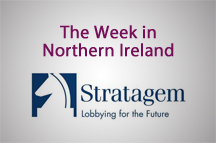 As another week passed in the Northern Ireland Assembly, so diminished the ever shortening life of the current mandate. With an election due to take place on 5th May and dissolution coming on 30th March, the timeframe for concluding Stormont’s outstanding business is becoming somewhat squeezed.
As another week passed in the Northern Ireland Assembly, so diminished the ever shortening life of the current mandate. With an election due to take place on 5th May and dissolution coming on 30th March, the timeframe for concluding Stormont’s outstanding business is becoming somewhat squeezed.
It is that time in an Assembly’s existence when the phrase ‘accelerated passage’ begins to appear on the order papers. As a host of legislative measures near completion, government’s capacity for speed and efficiency tends to become more pronounced. Other terms such as ‘urgent procedure’ will also come into play as thorny policy issues – such as the closure of the Northern Ireland Renewable Obligation for onshore wind, in line with the UK Energy Bill – remain unresolved.
The serious implications of a lack of a closure order for energy developers, investors and consumers alike illustrate the limitations of devolution when both the Treasury and the Department of Energy and Climate Change lean towards a particular outcome.
Elsewhere, there seems to be a last minute flourish of public health related activities with the prospect of a consultation on the introduction of a sugar tax and the ban on smoking in cars carrying children finding their way, via amendments, into the Health (Miscellaneous Provisions) Bill.
An especially significant institutional development came this past Monday, as John McCallister’s private member’s initiative, the Assembly and Executive Reform (Assembly Opposition) Bill, passed its final stage four and a half years after the Independent MLA began his work on it. The new law will permit parties in Stormont to organise themselves into an official Opposition for the first time since 1972 – the point at which direct rule from Westminster was reintroduced and the old Northern Ireland Parliament ceased to exist.
.jpg) Given that the current governmental structures do not actually allow for such a system to exist – the Assembly model is consociational – the future existence of some degree of opposition to the power-sharing arrangements represents a notable change in our political reality.
Given that the current governmental structures do not actually allow for such a system to exist – the Assembly model is consociational – the future existence of some degree of opposition to the power-sharing arrangements represents a notable change in our political reality.
These reforms lie in Stormont’s future, a future set to be formed by the May elections, and underpinned by the next Programme for Government (PfG).
With respect to the former, observers and commentators alike will be fascinated to see if the electorate approves or rejects traditional voting behaviour when polling day comes. Will a mandate marked by bruising political discourse, public dissatisfaction and more than one existential crisis lead to a shake-up in the established order? What impact can the rise of Sinn Féin in the Republic of Ireland have on electoral dynamics north of the border?
Whatever the outcome of the May contest, organisations must vie for position within the new slimline departments (reducing from 12 to nine) when it comes to lobbying for their concerns to be met by the PfG. As Northern Ireland is expected to apply an outcomes-based wellbeing framework to public policy and service delivery for the next five years, looking to wellbeing journey of our Scottish neighbours will prove more than helpful.














